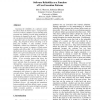Free Online Productivity Tools
i2Speak
i2Symbol
i2OCR
iTex2Img
iWeb2Print
iWeb2Shot
i2Type
iPdf2Split
iPdf2Merge
i2Bopomofo
i2Arabic
i2Style
i2Image
i2PDF
iLatex2Rtf
Sci2ools
HICSS
1999
IEEE
1999
IEEE
Software Reliability as a Function of User Execution Patterns
Assessing the reliability of a software system has always been an elusive target. A program may work very well for a number of years and this same program may suddenly become quite unreliable if its mission is changed by the user. This has led to the conclusion that the failure of a software system is dependent only on what the software is currently doing. If a program is always executing a set of fault free modules, it will certainly execute indefinitely without any likelihood of failure. A program may execute a sequence of fault prone modules and still not fail. In this particular case, the faults may lie in a region of the code that is not likely to be expressed during the execution of that module. A failure event can only occur when the software system executes a module that contains faults. If an execution pattern that drives the program into a module that contains faults is never selected, then the program will never fail. Alternatively, a program may execute successfully a modu...
Biometrics | Execution Patterns | Faults | HICSS 1999 | Software |
Related Content
| Added | 03 Aug 2010 |
| Updated | 03 Aug 2010 |
| Type | Conference |
| Year | 1999 |
| Where | HICSS |
| Authors | John C. Munson, Sebastian G. Elbaum |
Comments (0)

